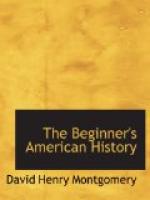[Footnote 9: Tecumseh: See paragraph 202.]
254. Lincoln becomes postmaster and surveyor; how he studied law; what the people thought of him as a lawyer.—After Lincoln returned from the war he was made postmaster of New Salem. He also found time to do some surveying and to begin the study of law. On hot summer mornings he might be seen lying on his back, on the grass, under a big tree, reading a law-book; as the shade moved round, Lincoln would move with it, so that by sundown he had travelled nearly round the tree.
[Illustration: LINCOLN READING LAW.]
When he began to practise law, everybody who knew him had confidence in him. Other men might be admired because they were smart, but Lincoln was respected because he was honest. When he said a thing, people knew that it was because he believed it, and they knew, too, that he could not be hired to say what he did not believe. That gave him immense influence.
255. The Armstrong murder trial; how Lincoln saved young Armstrong from being hanged.—But Lincoln was as keen as he was truthful and honest. A man was killed in a fight near where Lincoln had lived, and one of Jack Armstrong’s[10] brothers was arrested for the murder. Everybody thought that he was guilty, and felt sure that he would be hanged. Lincoln made some inquiry about the case, and made up his mind that the prisoner did not kill the man.
Mrs. Armstrong was too poor to hire a lawyer to defend her son, but Lincoln wrote to her that he would gladly do it for nothing.
When the day of the trial came, the chief witness was sure that he saw young Armstrong strike the man dead. Lincoln questioned him closely. He asked him when it was that he saw the murder committed. The witness said that it was in the evening, at a certain hour, and that he saw it all clearly because there was a bright moon. Are you sure? asked Lincoln. Yes, replied the witness. Do you swear to it? I do, answered the witness. Then Lincoln took an almanac out of his pocket, turned to the day of the month on which the murder had been committed, and said to the court: The almanac shows that there was no moon shining at the time at which the witness says he saw the murder.[11] The jury was convinced that the witness had not spoken the truth; they declared the prisoner “Not guilty,” and he was at once set free.
Lincoln was a man who always paid his debts. Mrs. Armstrong had been very kind to him when he was poor and friendless. Now he had paid that debt.
[Footnote 10: See Jack Armstrong, in paragraph 251.]
[Footnote 11: The almanac usually gives the time when the moon rises; and so by looking at any particular day of the month, one can tell whether there was a moon on that evening.]
256. Lincoln and the pig.—Some men have hearts big enough to be kind to their fellow-men when they are in trouble, but not to a dumb animal. Lincoln’s heart was big enough for both.




